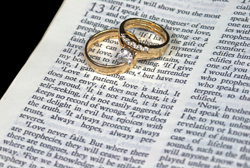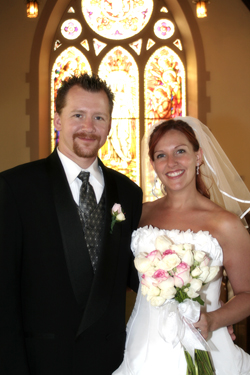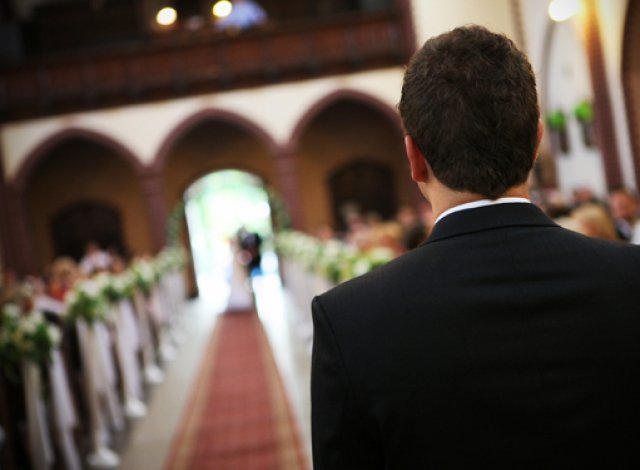What is marriage?
Following the news that Church of England vicars have conducted as many as 1,000,000 invalid marriages over the past 30 years, we advise you on how to ensure your nuptials are 100% legally binding...
It's been revealed that two million husbands and wives — ‘wedded’ couples — are not actually legally married! The Daily Mail recently reported the news that Church of England lawyers admitted that in 1,000,000 instances over the past 30 years, vicars had used the wrong form of words during the reading of wedding banns. The Church of England, however, have refuted the claim.
The problem arose following the discovery that Church lawyers failed to change the 1949 Marriage Act so that it included the updated wording of the banns as introduced in the new prayer book of 1980, which begs the question 'what is marriage?' amongst brides-to-be. The wording initially asked the congregation ‘if any of you know cause, or just impediment, why these two persons should not be joined together in Holy Matrimony.’ In contrast, the new wording asks if anyone knows a ‘reason in law’ to stop the marriage, leaving CofE vicars red-faced as up to one million of their marriages were deemed null and void.
In response to the allegations leading CofE lawyer, Charles George, told the Synod; “This matter has troubled ecclesiastical lawyers for some time. There is a doubt over the legality of marriages conducted in the intervening period.”
Senior Church lawyer Timothy Briden also provided an official statement in response to the potentially damaging claims; “Many marriages have taken place under the new forms. I assure the Synod that this does not invalidate the banns neither does it invalidate the marriages which have taken place under such forms.”
Whilst Synod documents described the unlawful banns as “unfortunate” Mr Briden assured church council members that the 1949 Marriage Act contained “robust” clauses to protect “a marriage that has been entered into in good faith by the parties.”
Essentially, the Church of England have concluded that despite these accusations, if a husband and wife believe they are lawfully married, the likelihood is that they are — and no variation in the wording of the banns changes this.
Make sure that you’re covered when it comes to the legal formalities of your wedding by following UKbride's simple guidelines as we answer your 'what is marriage?' queries!
• The first legal requirement states that you must not be related to each other in a way that is forbidden by law. This restricts marriage between blood relatives and close family.
• Secondly, it is important to remember that the minimum age for marriage is 16 years of age. However, in England and Wales anybody under the age of 18 must also have the written consent of a parent or guardian.
• Furthermore — although it sounds obvious — both partners must be acting under their own consent; they must not be forced into marriage through arrangement by any other persons.
• In addition, official evidence will be required if you have been married before; for example if you are widowed or divorced.
When choosing your venue, make sure that it is one of the following; A District Register Office, a church or chapel of The Church of England or Church of Wales, an approved building (approved by the local authority under procedures dictated by the marriage Act 1994), or a Naval, Military or Air Force chapel. If it does not fall into one of these categories, the likelihood is that your marriage will not be legal!
And here’s how to avoid joining the two million ‘husbands and wives’ who have had an invalid Church of England wedding!
• Before you get married, you need a legal license to do so.
• For most Church of England marriages, this is done by publishing ‘Banns of Marriage’ — a series of three public announcements outlining your intention to marry.
• A Banns Certificate will be awarded after banns have been published three times.
• If either of you or your partner are not UK citizens, you will need a ‘Common License’ instead of the banns as outlined above.
And finally... a couple planning to marry in a Church of England ceremony in a church within a parish are welcome to do, so as long as one of the following applies:
• One of you was baptised or prepared for confirmation in the parish;
• One of you has ever lived in the parish for six months or more;
• One of you has at any time regularly attended public worship in the parish for six months or more;
• One of your parents has lived in the parish for six months or more in their child’s lifetime;
• One of your parents has regularly attended public worship there for six months or more in their child’s lifetime;
• Your parents or grandparents were married in the parish.
If you’re still uncertain, consult your vicar or registrar — who are well qualified to answer any 'what is marriage' queries, and ensure you won’t be joining the two million spouses whose seemingly void marriages have shocked the nation!

You can marry in a church or chapel of The Church of England or Church of Wales.

Ensure your wedding Banns have been correctly announced!

Legally bound newlyweds!

